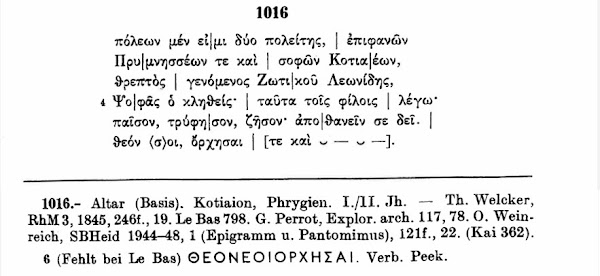Tuesday, November 01, 2022
Dual Citizenship
Inscription from Kotiaion in Phrygia, 1st-2nd century AD, in Reinhold Merkelbach and Josef Stauber, edd., Steinepigramme aus dem griechischen Osten, Bd. 3: Der „Ferne Osten“ und das Landesinnere bis zum Tauros (München: K.G. Säur, 2001), p. 283, number 16/32/05:
Georg Kaibel, Epigrammata Graeca ex Lapidibus Conlecta (Berlin: Reimer, 1878), p. 161, number 362:
Werner Peek, Griechische Vers-Inschriften, Vol. I: Grab-Epigramme (Berlin: Akademie-Verlag, 1955), p. 285, number 1016:
Transcription of the Greek followed by my translation:
Update. Thanks very much to Gonzalo Jerez Sánchez for the following information:
There is a Latin translation of the epitaph in Ed. Cougny, Epigrammatum Anthologia Palatina cum Planudeis et Appendice Nova Epigrammatum Veterum ex Libris et Marmoribus, Vol. III (Paris: Firmin-Didot, 1890), p. 158 (number 405), omitting the last fragmentary line:
Newer› ‹Older
πόλεων μέν εἰμι δύο πολείτης, ἐπιφανῶνI don't understand θεόν σοι, ὄρχησαι in the last line. Merkelbach and Stauber translate it as "Bei Gott, tanze," and I've followed them, but is an accusative of exclamation (I don't see any other way to parse it) really possible here? Also, it seems a stretch to identify Leonides as "ein Tänzer" on the basis of ὄρχησαι. Franco Mosino, in Epitaffi greci. La Spoon River ellenica di W. Peek (Milan: Bompiani, 2019), p. 487, translates θεόν σοι, ὄρχησαι as "Un dio per te, e danza," but that doesn't explain the accusative.
Πρυμνησσέων τε καὶ σοφῶν Κοτιαέων,
θρεπτὸς γενόμενος Ζωτικοῦ Λεωνίδης,
Ψόφαξ ὁ κληθείς· ταῦτα τοῖς φίλοις λέγω·
παῖσον, τρύφησον, ζῆσον· ἀποθανεῖν σε δεῖ.
θεόν σοι, ὄρχησαι [τε καὶ ⏑–⏑–].
I am a citizen of two cities, famous
Prymnessos and wise Kotiaion,
Leonides, the foster son of Zotikos,
the one called Psophax [i.e. Noisy]; this I say to my friends:
Play, have a good time, live; you must die.
By God, dance and ...
Update. Thanks very much to Gonzalo Jerez Sánchez for the following information:
No comment in Wackernagel nor Schwyzer but this could help with that accusative: Bos, L. (1830), Greek ellipses, London, pp. 185-186.These pages in Bos concern the ellipse of ὄμνυμι (I swear), and two of his examples are especially apposite, first Carmina Anacreontea 9 West, lines 1-2 (ἄφες με, τοὺς θεούς σοι, / πιεῖν, πιεῖν ἀμυστί) and second Marcus Aurelius, Meditations 7.17.1 (ἀπέρχου, τοὺς θεούς σοι, ὡς ἦλθες). For more examples see Alexia Zotou, Carmina Anacreontea 1‒34: Ein Kommentar (Berlin: De Gruyter, 2014), p. 63. So the last line of my translation should read "(I swear by) God to you, dance and..."
There is a Latin translation of the epitaph in Ed. Cougny, Epigrammatum Anthologia Palatina cum Planudeis et Appendice Nova Epigrammatum Veterum ex Libris et Marmoribus, Vol. III (Paris: Firmin-Didot, 1890), p. 158 (number 405), omitting the last fragmentary line:
Urbium quidem sum duarum civis illustrium,To Merkelbach and Stauber's note on names ending in -αξ add Paul Kretschmer and Ernst Locker, Rückläufiges Wörterbuch der griechischen Sprache, 2. Aufl. Mit Ergänzungen von Georg Kisser (Göttingen: Vandenhoeck & Ruprecht, 1963), pp. 197-200, 697 (ψόφαξ on p. 200), and Douglas Olson and Ryan Seaberg, Kratinos, frr. 219-514 (Göttingen: Vandenhoeck & Ruprecht, 2018 = Fragmenta Comica, Bd. 3.6), p. 246 (on Kratinos, fragment 416).
Prymnessensiumque et sapientium Cotiæensium,
alumnus qui fui Zotici, Leonides
Psophax cognominatus: hæc amicis dico:
Lude, voluptati indulge, vive: mori te oportet.



